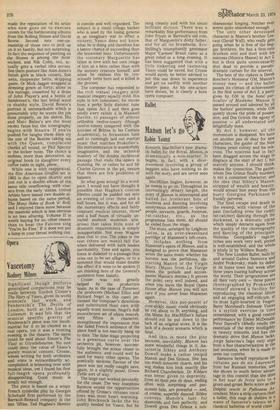Ballet
Manon let's go
Robin Young
Kenneth MacMillan's new dramatic ballet for the Royal, Manon,. is dramatically a non-starter. It begins, in fact, with a divertissement involving a group of beggars who have nothing to do with the story, and are never seen again.
MacMillan begins, however, as he means to go on. Throughout its increasingly dreary length, the story of Manon is interrupted and halted for irrelevant bits of business and dancing involving anonymous nonentities — townspeople, servants, guards, footmen, rat-catcher, etc., as the programme lists them. All should be exiled from the stage.
The score, arranged by Leighton Lucas, is an over-sweetened porridge of Massenet's left-overs. It includes nothing from Massenet's opera of Manon, and is designed to prove that Massenet wrote the same music whether his heroine was the perfidious, distracting Manon or the Virgin Mary. (Music from La Vierge forms the prelude and accompanies Manon's demise.) It proves the point very well indeed, and when you leave the Royal Opera House after Manon you will not care if you never hear Massenet again.
However, this pot-pourri of over-sickly music could obviously be cut about to fit anything, and the blame for MacMillan's failure should not be put down to the lack of an original score. It is the lack of a decent scenario which is fatal.
And this is more the pity because, inevitably, Manon has some wonderful things in it. Antoinette Sibley and Anthony Dowell make a rather insipid Manon and Des Grieux. She has too much innocent charm, and his wig makes him look exactly like Richard Chamberlain. Dr Kildare was never given to depravity. Even so their pas de deux, ending often with surprising and passionate falls, are powerful — and, of course, superbly danced. Sibley conveys Manon's lust for diamonds and furs perfectly, and Dowell gives Des Grieux a sub
obsessional longing. Neither ever seems quite abandoned enough. The only other developed character is Manon's brother Lescaut (David Wall), who really gets going when he is free of the beggar brethren. He has a first-rate drunken solo and duet with his mistress (Monica Mason) in Act 2, but is then quite unnecessarily shot dead to provide a pseudo' dramatic curtain for the interval.
The best of the ciphers is Derek Rencher's Monsieur GM, Manon's money man — and the ballet passes its climax of achievement in the first scene of Act 2, a partY given by GM in the hotel particulier of Madame. Manon is passed around and admired by all the harlots' gentlemen, while GM quietly shows the pride of possession, and Des Grieux the agony of passion — all understated and delightfully done. By Act 3, however, all the momentum is dissipated. We have yet another pas de deux for new characters, the gaoler of the New Orleans penal colony and his mistress. The mistress had in fact been dragged across the stage in disgrace at the start of Act 1, but scarcely anyone, I should think, makes the connection. The gaoler', whom Des Grieux finally murders, is not a consistent character, and the idea that Sibley's Manon, stripped of wealth and beauty, would attract him away from the busty Georgina Parkinson Is frankly perverse. The final escape and death in the swamp, with visions of the past (including even the ruddY rat-catcher) dancing through the duckweed, is a dramatic cliche which simply detracts again from the quality of the choreography and dancing of the principals. Nicholas Georgiadis's rags-toriches sets work very well, period is well-established, and the whole is nicely lit by William Bundy. The New London Ballet, built bY and around Galina Samsova and Andre Prokovsky,, made its debut in its home town last week after three years touring halfway across the world. Their programmes are all their very own — three pieces choreographed by ProkovskY himself showed a facility for reproducing the classical idiom and an engaging self-ridicule, at its most light-hearted in Vespri, Barry Moreland's Intimate Voices is a stylish exercise in tirne remembered, with a good central performance by Elaine McDonald. Peter Darrell's Othello retells the essentials of the story intelligiblY in twenty minutes, and has the dramatic drive that Manon lacks. Jorge Salavisa's Iago only slips from a fine characterisation in the last moments, when he is made to seem too contrite.
Samsova herself reproduces the virtuoso pas de six Laurencta from her Russian memories, and she shows to much better advantage in this context than she doeS in her tour de force solo to a grunt-and-groan Berio score as the Delphic oracle in Pythoness As' cendant. More a strip cartoonthan a ballet, this coup de theatre is a waste of Samsova's talents as a classical ballerina of world class.


































 Previous page
Previous page